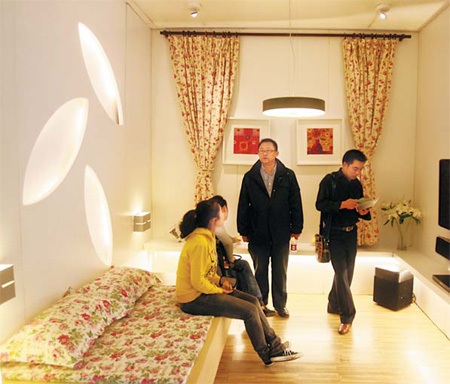Top Biz News
Philips casts light on Green energy-saving products
By Bian Yi (China Daily)
Updated: 2009-12-28 08:08
 |
Large Medium Small |
|
Citizens visit Philips Lighting's model "green lighting house" in Wuhan. The company is devoted to promoting energy-saving lights via residential community education around China. [File photo] |
Meng Guiyuan, a 62-year-old Nanjinger, went to a neighboring supermarket to buy light bulbs and selected the most energy-saving ones.
"Though the price is about six to seven times that of a traditional incandescent lamp, it has a much longer life and can save much electricity," said the man who had recently taken part in a community activity held by Philips Lighting that focused on energy-saving lighting.
"Before that event, I would have chosen the cheap one. But now I know the higher lighting efficiency, resulting in less electricity expenditure, can not only save money for me but also contribute to environmental protection," said Meng.
He is just one among tens of thousands of residents in five cities - Shenyang, Zhengzhou, Nanjing, Wuhan and Shanghai - who have received Philips Lighting's community education.
It built model "green lighting houses" in residential communities to help people know how to light their homes with energy-saving lighting gadgets and devices.
Meanwhile, it sent its light fixtures free of charge to households, inspiring residents to experience energy-saving lives.
According to Philips Lighting, the core of the education is to help people understand that energy-saving bulbs can translate into money savings and environmental protection, thereby increasing consumers' incentives to buy such products.
The company's program is in line with China's policy to popularize energy-saving products nationwide. It supports government efforts to promote more efficient lamps by offering subsidies of up to 50 percent on retail sales.
The massive subsidy program, which came into effect in April, 2008, is part of a plan to usher in 150 million energy-saving bulbs by the end of 2009.
According to Liu Shengping, vice-president of the China Association of Lighting Industry, the number of incandescent lumps in use in China was 4.3 billion at the end of 2008, but is noticeably on the drop.
Meanwhile, energy-saving bulbs, on the other hand, were rapidly increasing, with more than 3 billion in use.
Liu attributed the positive change to not only the subsidy program but also growing environmental awareness among Chinese consumers, which Philips Lighting has contributed to in recent years.
By the end of June, the company had donated 100,000 energy-saving lamps in Ansai, Shaanxi province, and 100,000 in the Tibet autonomous region.
In Shaanxi, the 100,000 bulbs are expected to result in a daily saving of 1,700 kWh, while the donated lamps used for 3.5 hours a day in Tibet are expected to translate into savings of 16,000 kWh annually.
Lighting is responsible for up to 35 percent of the energy bill of a typical building in China, according to the National Bureau of Statistics.
As energy efficiency is high on the government's agenda, it is the responsibility of Philips Lighting, which is doing well in the market place, to help the government solve the problem. The government supports Philips Lighting's sustainable development here, the company said.
Philips' sales revenue from energy efficient lighting in China was 1.4 billion yuan in 2008, which is more than half of total product sales.














